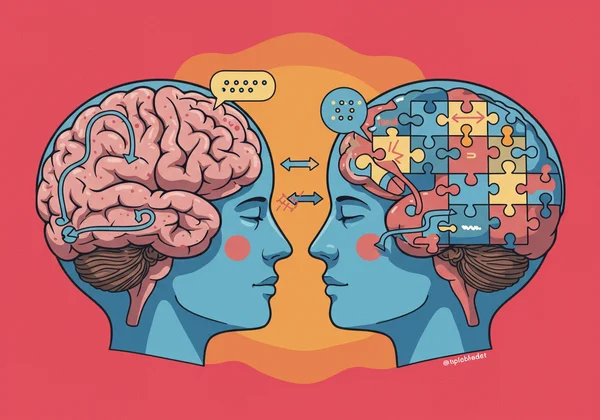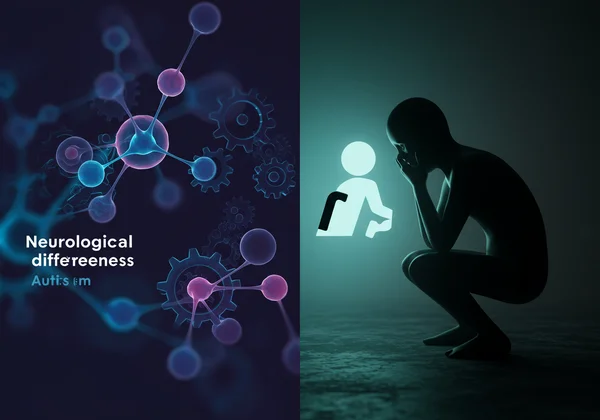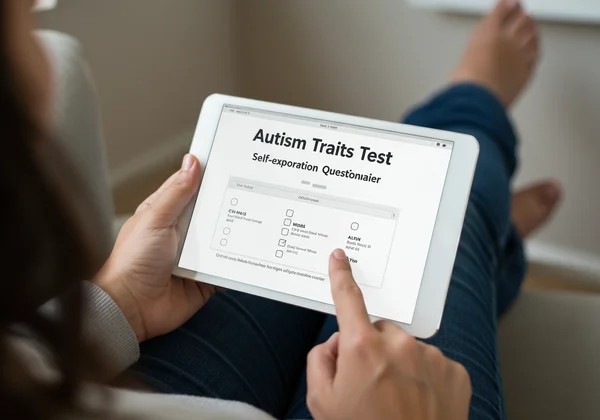Autistic Test: Autism or Social Awkwardness? Find Out
Feeling constantly out of sync in social situations? You're not alone. Many people navigate the world feeling like they missed the memo on social interactions. This often leads to a critical question: Am I autistic or just socially awkward? This comprehensive guide will help you understand the key differences, validate your experiences, and provide clarity on whether an autistic test could be your next step toward profound self-discovery. If you're seeking answers, you've come to the right place to start your exploration.
Understanding Social Awkwardness and Social Anxiety
Before diving into autism, it's essential to understand other common reasons for social difficulties. Social awkwardness and social anxiety are often used interchangeably, but they represent distinct experiences that differ significantly from the neurological underpinnings of autism. Untangling them is the first step toward clarity.

What General Social Awkwardness Feels Like
Social challenges are a universal part of the human experience. Social awkwardness is typically situational. It's that cringe-worthy moment when you tell a joke that doesn't land, forget someone's name right after they've said it, or stand silently, unsure of how to join a conversation.
These moments are uncomfortable but temporary. They don't necessarily define every social interaction you have. A person who is socially awkward might feel perfectly at ease with close friends or in structured environments but struggle in new or unpredictable social settings. The feeling is often one of misstepping, rather than being fundamentally different.
How Social Anxiety Impacts Interactions and Confidence
Social anxiety, on the other hand, is more than just occasional awkwardness; it's a persistent fear of being judged, scrutinized, or negatively evaluated by others. This fear can be so intense that, it can lead to the avoidance of social situations altogether. It’s not just about what happens during the interaction, but the intense worry before and the harsh self-critique after.
Unlike simple awkwardness, social anxiety is rooted in fear. A person with social anxiety might know exactly what the "correct" social response is but be too afraid to act on it. Their coping mechanisms often involve avoiding eye contact, speaking very little, or leaving events early to escape the overwhelming feeling of being watched.
Exploring Autistic Social Communication Differences
This brings us to autism, which presents a different framework for understanding social difficulties. For autistic individuals, social challenges are not primarily caused by fear or temporary missteps but by fundamental differences in how their brains process social information. These are key signs of autism social interaction that distinguish it from anxiety or awkwardness.
Decoding Unwritten Social Rules and Non-Verbal Cues
Much of neurotypical social interaction relies on unspoken rules and subtle non-verbal communication. Things like body language, tone of voice, sarcasm, and facial expressions are often understood implicitly. For many autistic people, these cues are like a foreign language that they must learn consciously and logically.

This can lead to misunderstandings. An autistic person might not realize a conversation is over, misinterpret a sarcastic comment as literal, or struggle to know when it's their turn to speak. It's a matter of processing differences, not a lack of interest or empathy. This constant mental effort to translate social cues is a significant part of the autistic experience known as "masking."
Communication Styles: Eye Contact, Conversation Flow, and Intense Interests
Autistic communication patterns can also differ. For example, forcing eye contact can be physically uncomfortable or distracting for some autistic individuals, making it hard to focus on the conversation. It's often a sign of sensory discomfort, not dishonesty or disinterest.
Conversations may also have a different flow. An autistic person might be incredibly passionate about their special interests and enjoy sharing detailed information, a practice sometimes called "info-dumping." While this is a way of connecting and sharing joy, it can be misinterpreted by those unfamiliar with this communication style. If you recognize these patterns in yourself, it may be helpful to explore these traits.
Key Distinctions: Autism Traits vs. Social Anxiety & Awkwardness
So, am I autistic or socially awkward? The answer often lies in the "why" and "how" behind the social difficulties. The root causes and consistency of these traits are the most significant differentiators.
Root Causes: Neurological Differences vs. Anxiety-Based Avoidance
The most crucial distinction is the origin. Autism is a neurodevelopmental condition, meaning it stems from differences in brain structure and function that have been present since birth. Social communication traits are an intrinsic part of an autistic person's neurology—it's how their brain is wired.

In contrast, social anxiety is an anxiety-based condition. The difficulty is not in understanding the social rules, but in the overwhelming fear associated with performing them. An anxious person might avoid a party because they are afraid of saying something foolish, whereas an autistic person might avoid it because the sensory environment (noise, lights, crowds) is overwhelming and the social demands are exhausting to process.
Consistency of Traits Across Different Social Settings
Another key difference is consistency. Social anxiety is context-dependent; it is primarily triggered by social or performance situations. When alone, a person with social anxiety may feel completely relaxed and at ease.
Autistic traits, however, are pervasive and present across all contexts, not just social ones. This includes things like sensory sensitivity (to lights, sounds, textures), a preference for routine and predictability, repetitive behaviors or movements (stimming), and deep, focused interests. These traits are part of who the person is, whether they are at a party or home alone. If you see these consistent patterns in your life, you can take the test now for more insight.
Next Steps: Is an Autistic Test Right for Your Self-Discovery?
Understanding these differences can bring a sense of relief and clarity. If you see yourself more in the descriptions of autistic traits, your next question might be about taking an autistic test. An online screening can be a valuable and empowering first step on your journey.
When to Consider an Online Autistic Traits Test
An online screening tool is a low-pressure, private way to begin your self-exploration. It's a good starting point if you:
-
Have felt "different" your entire life but never had a word for it.
-
Deeply relate to the experiences of autistic people you see online or in media.
-
Find that the challenges you face go beyond social situations and include sensory, routine, or interest-based traits.
-
Are seeking a framework to better understand yourself and your needs.

Our screening tool is designed to help you explore these possibilities in a safe and confidential environment.
Seeking Professional Guidance After Initial Exploration
It is vital to remember that an online test is a screening tool, not a formal diagnosis. Its purpose is to indicate whether you have a significant number of autistic traits and whether further exploration is warranted. A high score doesn't definitively mean you are autistic, just as a low score doesn't definitively rule it out.
If your results resonate with you, the next step is to seek an evaluation from a qualified professional who specializes in adult autism diagnoses. A professional can provide a comprehensive assessment and a formal diagnosis, which can be a gateway to support and accommodations.
Your Journey to Clarity Begins Here
Untangling the threads of social awkwardness, social anxiety, and autism is a deeply personal journey. Understanding that autism is a neurological difference—not a personal failing—can be life-changing. It reframes a lifetime of challenges into a new narrative of self-awareness and acceptance.
Your experiences are valid, and your questions deserve answers. If this guide has resonated with you, your journey to clarity may be just beginning. Ready to take the first step? Take the free autistic test on our homepage. Our science-informed screening can provide you with immediate, private insights and an optional AI-powered report to help you make sense of your traits and plan your next steps.
Frequently Asked Questions About Autism & Social Traits
How do I know if I'm autistic or just socially awkward?
The key difference lies in the root cause and consistency. Social awkwardness is often situational and based on social missteps. Autism involves lifelong, consistent patterns of social communication differences, sensory sensitivities, and specific interests rooted in neurology. If your challenges are present even when you're alone and extend beyond social scenarios, it might point toward autistic traits.
Can someone be "slightly autistic" or is it all or nothing?
Autism is a spectrum, which means it presents differently in everyone. There is a vast diversity within the autistic community. While there isn't a state of being "slightly autistic," a person can have autistic traits that are more or less pronounced and require varying levels of support. The spectrum concept reflects this wide range of experiences.
Is an online autistic test accurate for self-exploration?
An online autistic test offered here can be a highly accurate and valuable tool for initial self-exploration. Our test is based on established screening questionnaires like the Autism-Spectrum Quotient (AQ) test, developed by Simon Baron-Cohen and his colleagues at Cambridge University. It is designed to identify traits commonly associated with autism. However, it is a screening tool, not a substitute for a formal diagnosis from a healthcare professional. You can try our free test to gain preliminary insights.
What steps should I take after identifying potential autistic traits?
After taking a screening test and reflecting on your traits, consider these steps. First, learn more from autistic creators and reputable sources. Second, connect with autistic communities online to hear about others' lived experiences. Finally, if you desire a formal diagnosis, research and contact a clinical psychologist or psychiatrist who specializes in adult autism assessments.